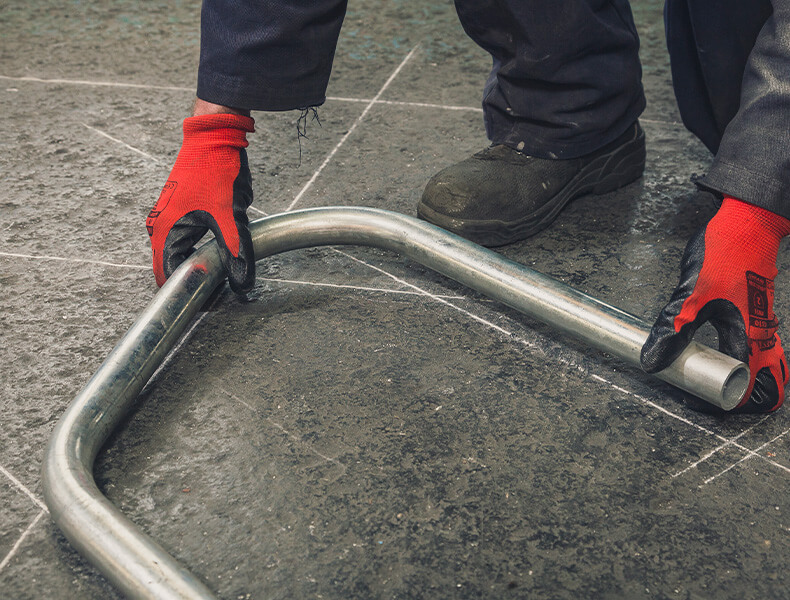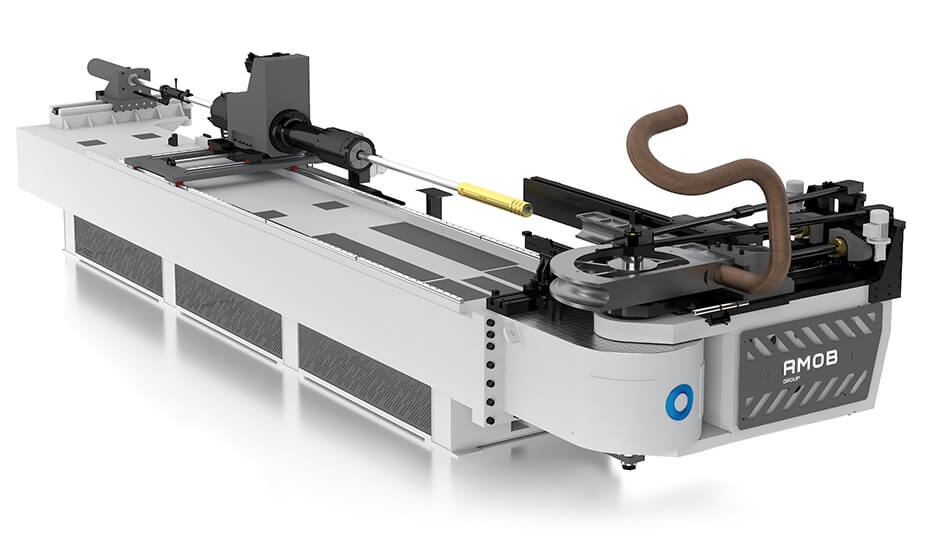Lionweld Kennedy continues investment across our Middlesbrough site with the exciting new delivery of the fully electric, multi stack CNC Tube Bending Machine.
In our recent news, Lionweld Kennedy have invested £1.5m across our site. With this investment, we have started construction of a carbon neutral multifunctional ‘Entrance’ building on the bank of Marsh Road, installation of a new Grating Shear machine and now the installation of our CNC Tube Bending machine.
This machine is CNC controlled and is capable of precision tube bending without deformation. This machine is designed for flexible, accurate, and repeatable tube bending to create our Saferail product, both modular and fabricated handrails.
What was Lionweld Kennedy’s previous process for handrails?
Previously, handrail bends were transferred from our drawing office using paper drawings to the factory floor using a full-scale chalk outline at a scale of 1:1. The operator then used manual tube benders to shape each bend, comparing it to the chalk template. Each bend was initially under-formed, allowing the operator to make final adjustments to meet the required tolerance and account for the tube’s “spring back”.
For projects involving extremely complex handrail shapes, a single operator may produce as few as 10 pieces of formed rail per shift. This obviously brings concerns with project lead times, a potential for inconsistencies with quality and a lack of scalability.

How does the machine help our process efficiencies?
The bending machine is engineered to streamline and enhance the production process for our bespoke Saferail products. Utilising 3D software, detailed handrail designs are translated into CNC data directly applicable to the tube bending machine.
Beyond its ability to import 3D files, the machine incorporates advanced features including automatic spring back compensation, customisable tooling configurations, geometry storage, and anti-collision simulation systems. These functionalities ensure component feasibility without the necessity of prototyping or material wastage.
This largely minimises the room for error in fabrication, ensuring that the handrail is exactly made to measure, reducing time in re-modifications. Reducing material wastage helps Lionweld Kennedy to continue implementing sustainable practices across our production.
How does this support the ongoing lean management process?
The proposed tube bending machine can produce handrails much faster, with a feed-in speed of 1600mm per second and a rotation speed of 28 degrees per second. It includes a built-in saw, eliminating the need for operators to pre-cut the material. This will double the production capacity of handrails, requiring only one operator.
Additionally, with the introduction of the new machine and ongoing lean implementation, the handrail department has been relocated and reconfigured to ensure optimal production efficiency.
Not only does this increase productivity, time and cost savings are a result of streamlined workflows and optimised layout which enhance production speed and reduce downtime.
Why did Lionweld Kennedy choose to invest in a CNC Tube Bending machine?
Two risks are immediately apparent in the current handrail production process. The first risk involves the manual transport of materials from a lower to a higher area. Introducing the CNC tube bending machine eliminates the need for the upper production area, thus addressing this manual handling concern.
The second, more significant long-term risk is the method operators use to mark the floor for handrail requirements. Operators spend considerable time moving between floor level (working on their knees) and standing at the manual bending machines. This issue has been raised as a concern by operators, as it poses a significant risk of long-term back and knee problems. The CNC Tube Bending machine provides a solution to these concerns.
The current team of operators is very skilled, and quality issues are rare. However, misunderstandings can occur when translating requirements from paper drawings to the floor, leading to errors. The CNC tube bending machine will solve this problem by receiving precise instructions directly from the drawing office via NC data from 3D models, ensuring 100% accuracy from design to finished product.
Additionally, the proposed machine’s ability to bend tighter radii with an internal mandrel significantly improves the quality of formed bends, resulting in no visible deformation of the tube walls.

What are Lionweld Kennedy’s future plans?
As we continue our lean management across our factories, we will be relocating the primary welding lines over to our east factory. Flow of product from cutting to welding, then directly onto the trailers for galvanising, drastically reducing material handling and movement on site.
Lionweld Kennedy continue to assert ourselves as leaders in steel manufacturing as we continue to invest in our production capabilities and improve our sustainable practices. Watch this space as we continue to provide updates on our carbon neutral ‘Entrance’ building!